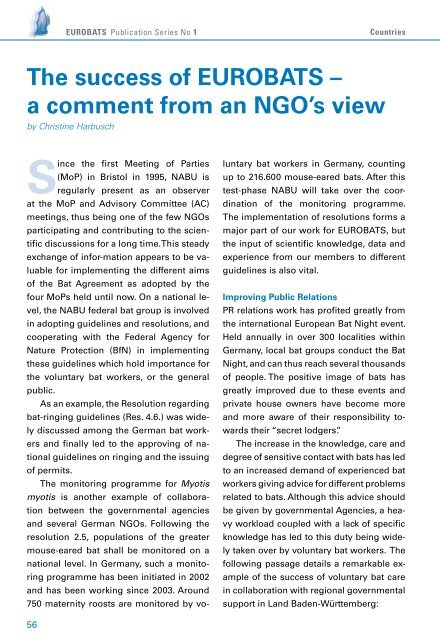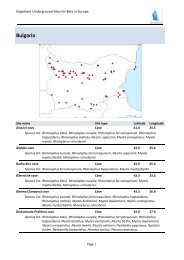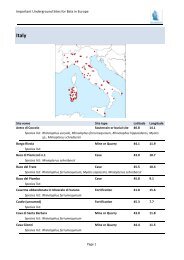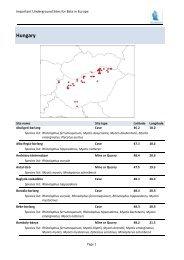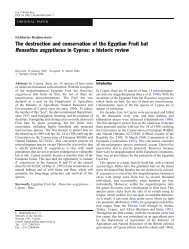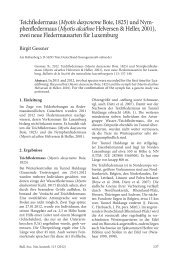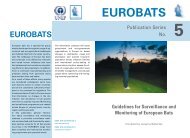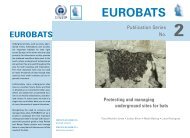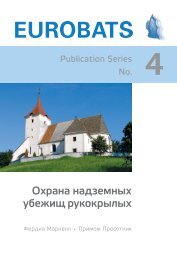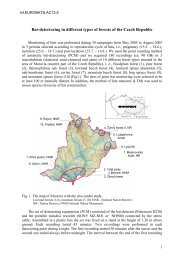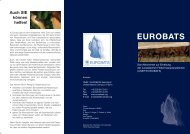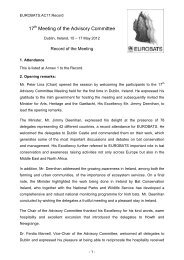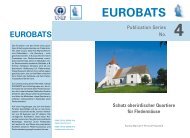1991 - 2006. EUROBATS celebrates its 15th anniversary
1991 - 2006. EUROBATS celebrates its 15th anniversary
1991 - 2006. EUROBATS celebrates its 15th anniversary
You also want an ePaper? Increase the reach of your titles
YUMPU automatically turns print PDFs into web optimized ePapers that Google loves.
6<br />
<strong>EUROBATS</strong> Publication Series No 1 Countries<br />
The success of <strong>EUROBATS</strong> –<br />
a comment from an NGO’s view<br />
by Christine Harbusch<br />
Since the first Meeting of Parties<br />
(MoP) in Bristol in 199 , NABU is<br />
regularly present as an observer<br />
at the MoP and Advisory Committee (AC)<br />
meetings, thus being one of the few NGOs<br />
participating and contributing to the scientific<br />
discussions for a long time. This steady<br />
exchange of infor-mation appears to be valuable<br />
for implementing the different aims<br />
of the Bat Agreement as adopted by the<br />
four MoPs held until now. On a national level,<br />
the NABU federal bat group is involved<br />
in adopting guidelines and resolutions, and<br />
cooperating with the Federal Agency for<br />
Nature Protection (BfN) in implementing<br />
these guidelines which hold importance for<br />
the voluntary bat workers, or the general<br />
public.<br />
As an example, the Resolution regarding<br />
bat-ringing guidelines (Res. 4.6.) was widely<br />
discussed among the German bat workers<br />
and finally led to the approving of national<br />
guidelines on ringing and the issuing<br />
of perm<strong>its</strong>.<br />
The monitoring programme for Myotis<br />
myotis is another example of collaboration<br />
between the governmental agencies<br />
and several German NGOs. Following the<br />
resolution 2. , populations of the greater<br />
mouse-eared bat shall be monitored on a<br />
national level. In Germany, such a monito-<br />
ring programme has been initiated in 2002<br />
and has been working since 2003. Around<br />
7 0 maternity roosts are monitored by vo-<br />
luntary bat workers in Germany, counting<br />
up to 216.600 mouse-eared bats. After this<br />
test-phase NABU will take over the coordination<br />
of the monitoring programme.<br />
The implementation of resolutions forms a<br />
major part of our work for <strong>EUROBATS</strong>, but<br />
the input of scientific knowledge, data and<br />
experience from our members to different<br />
guidelines is also vital.<br />
Improving Public Relations<br />
PR relations work has profited greatly from<br />
the international European Bat Night event.<br />
Held annually in over 300 localities within<br />
Germany, local bat groups conduct the Bat<br />
Night, and can thus reach several thousands<br />
of people. The positive image of bats has<br />
greatly improved due to these events and<br />
private house owners have become more<br />
and more aware of their responsibility towards<br />
their “secret lodgers”.<br />
The increase in the knowledge, care and<br />
degree of sensitive contact with bats has led<br />
to an increased demand of experienced bat<br />
workers giving advice for different problems<br />
related to bats. Although this advice should<br />
be given by governmental Agencies, a heavy<br />
workload coupled with a lack of specific<br />
knowledge has led to this duty being widely<br />
taken over by voluntary bat workers. The<br />
following passage details a remarkable example<br />
of the success of voluntary bat care<br />
in collaboration with regional governmental<br />
support in Land Baden-Württemberg:


